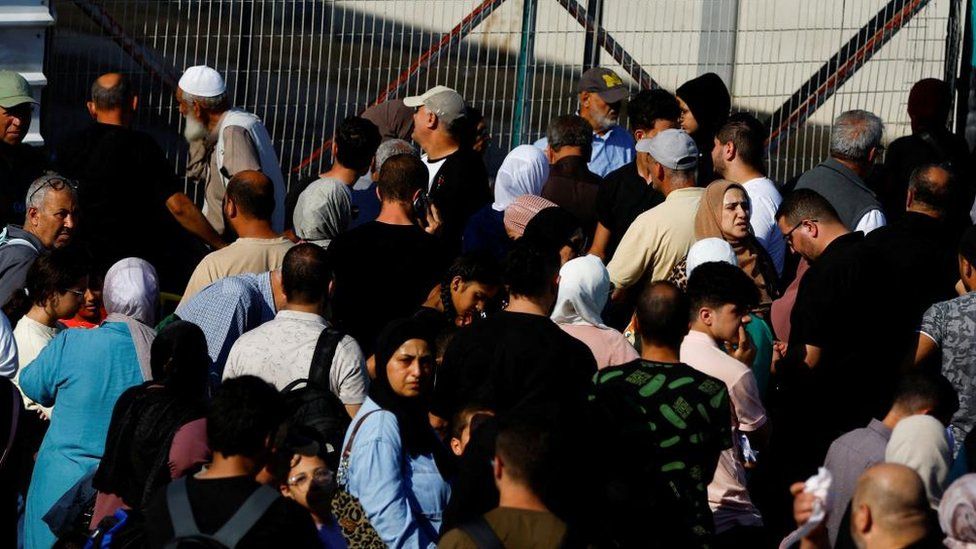Thousands of people in Gaza have gathered at the Rafah border crossing with Egypt, as diplomatic efforts continue to open it before Israel starts its expected ground operation.
But the United Nations said there had been no progress in negotiations on reopening of the crossing.
Cairo blames Israel for “not co-operating”.
All routes out of Gaza are closed, as Israel continues its air strikes in response to Hamas’ attack of 7 October.
US Secretary of State Antony Blinken arrived in Israel on Monday for the second time in less than a week.
After his tour of six Arab states in the region, he returned to the country in an attempt to push for the reopening of the crossing to let in humanitarian aid and evacuate foreign passport holders.
Both Mr Blinken and UK Foreign Secretary James Cleverly said they were working with Israel, Egypt and “other leading political voices in the region” to re-open the crossing.
The Israeli military ordered a blockade of Gaza and cut off the supply of water, food and fuel last week before launching a wave of air strikes in retaliation to Hamas’ deadly attack on Israel during which militants raided communities, kidnapped civilians and soldiers and killed more than 1,400 people.
- What is the Rafah crossing and why is it Gaza’s lifeline?
On Monday morning, thousands of civilians rushed to the Rafah crossing following reports that it would be temporarily re-opened during a brief ceasefire on Monday.
Both Israel and Hamas swiftly denied that any such agreement had been made.
Later, a BBC correspondent in southern Gaza confirmed an air strike had hit the area around the crossing, damaging a building on the Palestinian side of the crossing as well as the road.
Israel has hit the area around the Rafah crossing point at least three times since it began its air campaign on Gaza.

The crossing represents the only potential exit point from Gaza while the Israeli siege of other entry points to the Hamas-controlled territory continues.
Dozens of lorries carrying fuel and aid supplies remain on the Egyptian side of the Rafah crossing, waiting for permission to enter, as the humanitarian situation in Gaza deteriorates.
Israel says the siege will not end until Hamas releases the hostages it seized from Israel on 7 October. The Israelis believe 199 people are being held in Gaza, up from an earlier estimate of 155.
Around 2,750 people have died in Gaza since the Hamas assault and more than one million people have been displaced.
- Gaza-Egypt border crossing should reopen, says UK
“There is an urgent need to alleviate the suffering of Palestinian civilians in Gaza,” Egypt’s Foreign Minister Sameh Shoukry said on Monday morning, adding that talks with Israel had been fruitless.
Cairo has been focusing on getting humanitarian aid for civilians into Gaza. Mr Shoukry said Egypt could allow medical evacuations and let in some Gazans with permission to travel.
A number of countries, including the US and the UK, have recommended that its citizens head towards the Rafah crossing, ready for its possible reopening.
Although Egypt appears to be prepared to re-open the Rafah crossing to allow foreign passport holders out and humanitarian aid in, it fears a massive influx of Palestinian refugees fleeing the war.
Egypt and other Arab states say a this would be unacceptable because it would amount to the expulsion of Palestinians from their land.
This video can not be played
